Serving 719 students in grades 5-8, Verrado Middle School ranks in the top 30% of all schools in Arizona for overall test scores (math proficiency is top 30%, and reading proficiency is top 30%).
The percentage of students achieving proficiency in math is 45% (which is higher than the Arizona state average of 35%). The percentage of students achieving proficiency in reading/language arts is 51% (which is higher than the Arizona state average of 40%).
The student:teacher ratio of 21:1 is higher than the Arizona state level of 17:1.
Minority enrollment is 59% of the student body (majority Hispanic), which is lower than the Arizona state average of 66% (majority Hispanic).
Quick Stats (2025)
- Grades: 5-8
- Enrollment: 719 students
- Student:Teacher Ratio: 21:1
- Minority Enrollment: 59%
- Overall Testing Rank: Top 30% in AZ
- Math Proficiency: 45% (Top 30%)
- Reading Proficiency: 51% (Top 30%)
- Science Proficiency: 40% (Top 30%)
- Source: National Center for Education Statistics (NCES), AZ Dept. of Education
School Overview
Verrado Middle School's student population of 719 students has declined by 12% over five school years.
The teacher population of 35 teachers has declined by 5% over five school years.
Grades Offered
Grades 5-8
Total Students
719 students
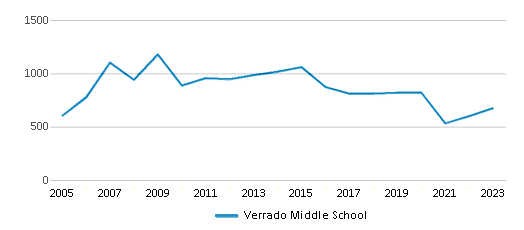
Gender %
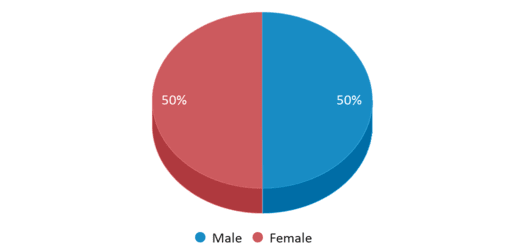
Total Classroom Teachers
35 teachers
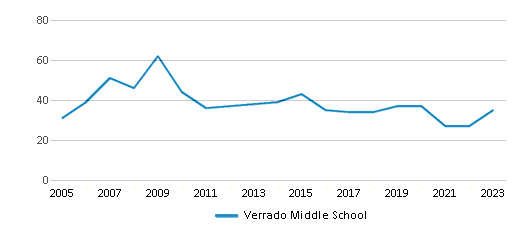
Students by Grade
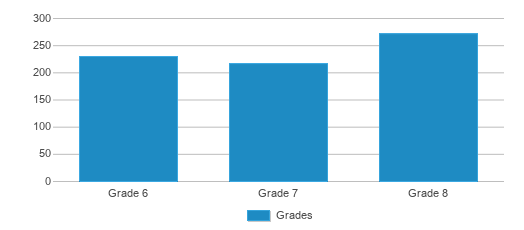
School Calendar
School Rankings
Verrado Middle School ranks within the top 30% of all 1,956 schools in Arizona (based off of combined math and reading proficiency testing data).
The diversity score of Verrado Middle School is 0.64, which is less than the diversity score at state average of 0.66. The school's diversity has stayed relatively flat over five school years.
Overall Testing Rank
#566 out of 1956 schools
(Top 30%)
(Top 30%)
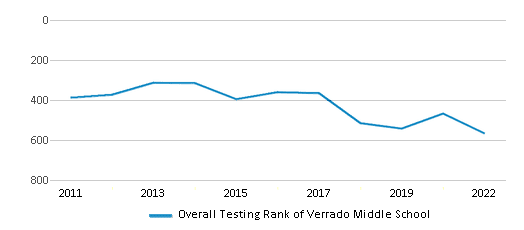
Math Test Scores (% Proficient)
45%
35%
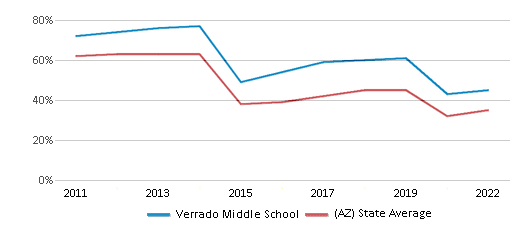
Reading/Language Arts Test Scores (% Proficient)
51%
40%
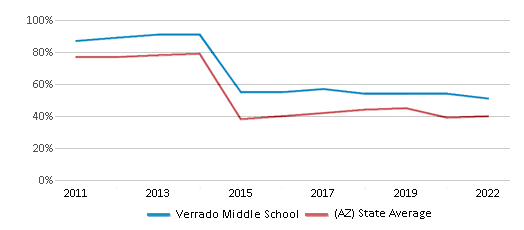
Science Test Scores (% Proficient)
40%
24%
Student : Teacher Ratio
21:1
17:1
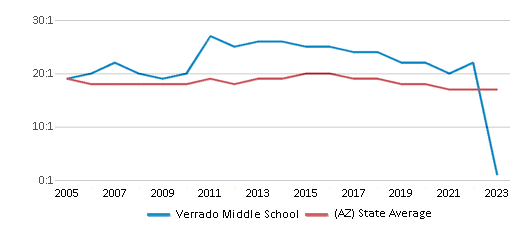
American Indian
n/a
5%
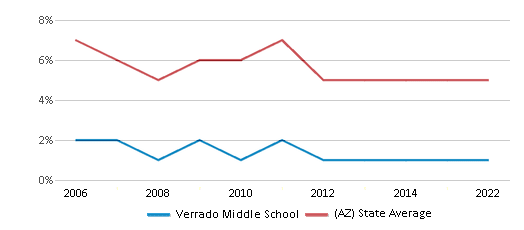
Asian
3%
3%
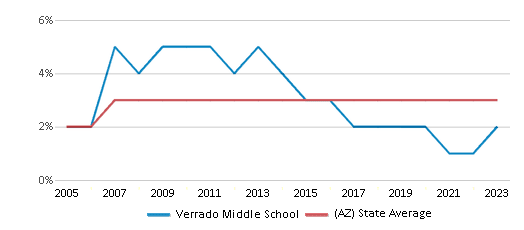
Hispanic
44%
48%
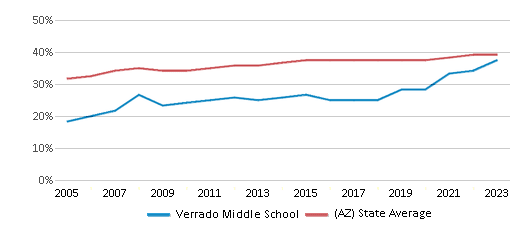
Black
5%
6%
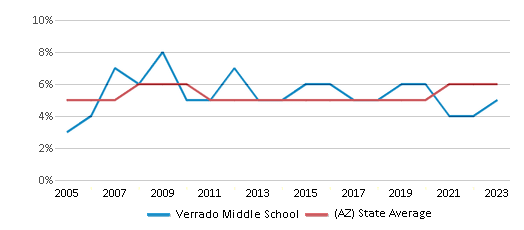
White
41%
34%
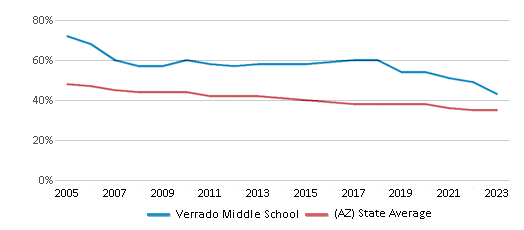
Hawaiian
n/a
n/a
Two or more races
7%
4%
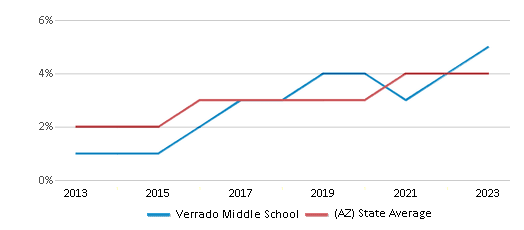
All Ethnic Groups
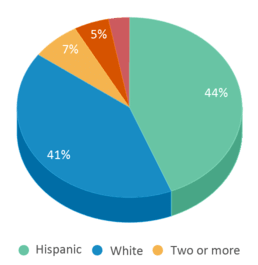
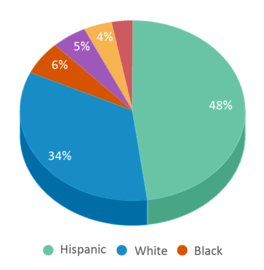
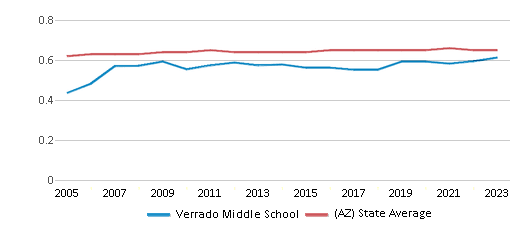
Eligible for Free Lunch
20%
40%
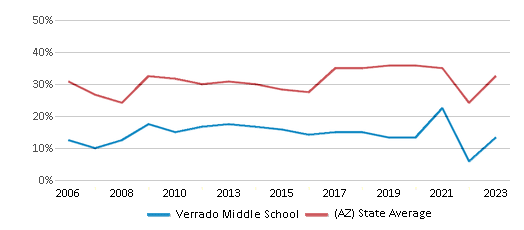
Eligible for Reduced Lunch
6%
10%
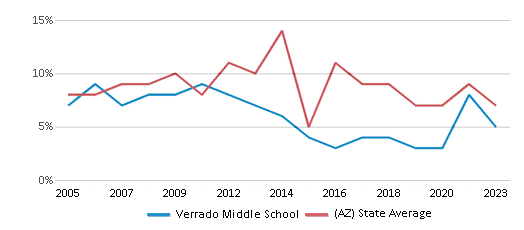
School Statewide Testing
School District Name
Source: National Center for Education Statistics (NCES), AZ Dept. of Education
Profile last updated: 02/09/2025
Frequently Asked Questions
What is Verrado Middle School's ranking?
Verrado Middle School is ranked #566 out of 1,956 schools, which ranks it among the top 30% of public schools in Arizona.
What percent of students have achieved state testing proficiency in math and reading?
45% of students have achieved math proficiency (compared to the 35% AZ state average), while 51% of students have achieved reading proficiency (compared to the 40% AZ state average).
How many students attend Verrado Middle School?
719 students attend Verrado Middle School.
What is the racial composition of the student body?
44% of Verrado Middle School students are Hispanic, 41% of students are White, 7% of students are Two or more races, 5% of students are Black, and 3% of students are Asian.
What is the student:teacher ratio of Verrado Middle School?
Verrado Middle School has a student ration of 21:1, which is higher than the Arizona state average of 17:1.
What grades does Verrado Middle School offer ?
Verrado Middle School offers enrollment in grades 5-8
What school district is Verrado Middle School part of?
Verrado Middle School is part of Litchfield Elementary District (4281) School District.
School Reviews
5 4/14/2023
great school.
5 7/23/2011
There is a schism between the performance and atmosphere of this school. Although you cant argue with the performance, you may ask attending children about how they feel about continuing to attend this school. There is a significant segregation between students that are accepted, and those that feel bullied. There are also predominantly newer/younger teachers that do not fit the conventional mold in appearance,actions, or attitudes. This is a great facility in a very good district, but has issues to overcome.
2 1/27/2010
Hi, I attended Verrado Middle School for about a month after I relized that the academics that I was learning were way behind. I am in 7 grade honors and I still feel behind in what I am learning. I feel that the math teachers are not really that observant of where their students are. If your child has gone to a private/christian school before I would not recommend this school just because they WILL become behind in their academics. The teachers and staff overall there are very nice and observant. The students have a lot of secretive things going on that most of the teachers fail to see. Once again I am on 7 grade honors. I am convincing my parents to send me back to my previous private school only becuase I absolutley love the enviroment there and I do not feel like I am becoming dumber by the second.
Review Verrado Middle School. Reviews should be a few sentences in length. Please include any comments on:
- Quality of academic programs, teachers, and facilities
- Availability of music, art, sports and other extracurricular activities
Recent Articles

What Is A Charter School?
Explore the world of charter schools in this comprehensive guide. Learn about their history, how they operate, and the pros and cons of this educational innovation. Discover key facts about charter schools, including admission policies, demographics, and funding, as well as what to look for when considering a charter school for your child.

10 Reasons Why High School Sports Benefit Students
Discover the 10 compelling reasons why high school sports are beneficial for students. This comprehensive article explores how athletics enhance academic performance, foster personal growth, and develop crucial life skills. From improved fitness and time management to leadership development and community representation, learn why participating in high school sports can be a game-changer for students' overall success and well-being.

February 05, 2025
Understanding the U.S. Department of Education: Structure, Impact, and EvolutionWe explore how the Department of Education shapes American education, from its cabinet-level leadership to its impact on millions of students, written for general audiences seeking clarity on this vital institution.









